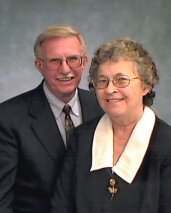
Dr. Harold & Myrna Carpenter
Educated in the School of Hard Knocks
by Dr. Harold R. Carpenter
TEXT: Philippians 4:10-1610 But I rejoiced in the Lord greatly, that now at last you have revived your concern for me; indeed, you were concerned [before,] but you lacked opportunity. 11 Not that I speak from want; for I have learned to be content in whatever circumstances I am. 12 I know how to get along with humble means, and I also know how to live in prosperity; in any and every circumstance I have learned the secret of being filled and going hungry, both of having abundance and suffering need. 13 I can do all things through Him who strengthens me. 14 Nevertheless, you have done well to share [with me] in my affliction. 15 And you yourselves also know, Philippians, that at the first preaching of the gospel, after I departed from Macedonia, no church shared with me in the matter of giving and receiving but you alone; 16 for even in Thessalonica you sent a gift more than once for my needs.
Introduction:
Dr. Walter Kaiser is perhaps the best biblical scholar in America today. It was my privilege to study hermeneutics, exegesis, and homiletics under him. It was his contention that all preaching should be expository. He also contended that in developing an expository sermon one should never use a proper name in the major headings of the sermon. He held that we should only refer to generalized principles by utilizing abstract nouns in our subject headings. I suppose I am a rebellious student because I disagree with him on both points.
As to the first point that all sermons should be expository; I highly favor the expository style but I would point out that both Jesus and Paul preached far more topical sermons than they did expository ones. They dealt with the problems (topics) that their audiences faced on a daily basis. They did not preach for the sake of preaching; rather they preached to communicate a needed message to their audiences.
On the second point I would point out that those who went before us and demonstrated their faith and victories in their struggles are called a "cloud of witnesses" and there is much that we can learn from their examples. This morning I would like to pull one example from that "cloud of witnesses" for our instruction and edification. What better example could we choose than the Pharisee from Tarsus who became a slave of Christ. We join him this morning in a cold jail cell in Rome.
I. Paul's Circumstances
A. Philippians 1:12-14 12 Now I want you to know, brethren, that my circumstances have turned out for the greater progress of the gospel, 13 so that my imprisonment in the cause of Christ has become well known throughout the whole praetorian guard and to everyone else, 14 and that most of the brethren, trusting in the Lord because of my imprisonment, have far more courage to speak the word of God without fear.
B. A prisoner in Rome1. Of Christ–not of CaesarC. A candidate for martyrdoma. A bond-slave of Christ–Philippians 1:12. Adverse physical conditions
b. He had a strong desire to go to Rome–Romans 15:22
(Roman prisons were not country clubs with gyms for CEOs)3. A preacher with a thorn in his flesh preaching to the palace from the prison!
a. Cold–remember he asked Timothy to hurry and bring him a coat
b. Sick–he was being poured out as a drink offering–Philippians 2:17
c. Broke–no offerings received from the churches–Philippians 4:15
d. Defamed–"I suffer hardship even to imprisonment as a criminal"–2 Timothy 2:9
e. Old and worn out–65 to 67 years old, but with "many miles on the road"–2 Corinthians 11:23-301. An ambassador in chains–Ephesians 6:20
2. Bound with two chains–Acts 21:33
3. Clothed in chains–Acts 28:20
4. He was beheaded in Rome in the year 67 A.D.
II. Paul's Education
A. Lack of support1. No offerings from any church except Philippi–Philippians 4:15B. A graduate of the rabbinical school of Gamaliel enrolls in the school of hard knocks
2. It had been years since he had received an offering from them–Philippians 4:1010 But I rejoiced in the Lord greatly, that now at last you have revived your concern for me; indeed, you were concerned before, but you lacked opportunity.1. The Pharisee of Pharisees needed some of the starch taken out of his shirtC. A graduate of the school of hard knocks gives the commencement address
2. "I have learned to be content. . .", emathon–this learning comes only through hard experiencea. I know how to get along in humble circumstances3. "I have learned the secret. . .", memeuemi, "to be instructed by a master"
b. I know how to get along in prosperitya. in any circumstance
b. in every circumstance
c. in abundance
d. in need1. "I can do all things. . .", ischuo, "to be strong, to have power"; panta, "all things":a. Endure2. This has nothing to do with winning high school football games or with CBC defeating BBC
b. Suffer
c. Tolerate
d. Put up with
3. It has everything to do with taking up the cross and following Christ
III. Paul's Example
A. Paul's preface to the believer9 The things you have learnedB. Paul's assurance to the believer
and received
and heard
and seen in me,
practice these things;
and the God of peace shall be with you.
(Philippians 4:9).19 And my God shall supply all your needs according to His riches in glory in Christ Jesus (Philippians 4:19).C. Paul's appeal to the believer1 Be imitators of me, just as I also am of Christ (1 Corinthians 11:1).
6 You also became imitators of us and of the Lord, having received the word in much tribulation with the joy of the Holy Spirit, 7 so that you became an example to all the believers in Macedonia and in Achaia (1 Thessalonians 1:6-7).
12 that you may not be sluggish, but imitators of those who through faith and patience inherit the promises (Hebrews 6:12).
Conclusion:
Paul wrote his letter from a prison, but it is a letter of joy.
Paul went from the prison cell to the chopping block.
He did not see deliverance in this life. That, however, was unimportant to him since he did not see himself as a prisoner of Caesar, but a servant of Christ.
His hope was not in this world but in the next.
18 For I consider that the sufferings of this present time are not worthy to be compared with the glory that is to be revealed to us (Romans 8:18).Paul's message to the Church is that trials do not defeat us, they mature us.
His is a shout of victory from the jail house:
20 according to my earnest expectation and hope, that I shall not be put to shame in anything, but [that] with all boldness, Christ shall even now, as always, be exalted in my body, whether by life or by death. 21 For to me, to live is Christ, and to die is gain (Philippians 1:20).
29 For to you it has been granted for Christ's sake, not only to believe in Him, but also to suffer for His sake, 30 experiencing the same conflict which you saw in me, and now hear to be in me (Philippians 1:29).
<><
This is the outline of the sermon Dr. Harold Carpenter preached 12 October 2003 in the morning service. Dr. Carpenter and his wife served as missionaries for twenty years. Dr. Carpenter also taught missions for twenty years at Central Bible College. He now serves as Pastor of Fair Grove Assembly of God, Fair Grove MO.
© Harold Carpenter 2003. Published by permission.
| John Russell Christian Ministries |
| Wholeness | Good News | Religion & Politics |
| Joke Break | Prophecy | Truth |
| Portal |
Special thanks to the following organizations:
Scripture quotations taken from the Amplified® Bible,
Copyright © 1954, 1958, 1962, 1964, 1965, 1987 by The Lockman Foundation
Used by permission. (www.Lockman.org/)
Scripture quotations taken from the New American Standard Bible®,
Copyright © 1954, 1958, 1962, 1964, 1965, 1987 by The Lockman Foundation
Used by permission. (www.Lockman.org/)
Scripture quotations taken from the New English Translation® Bible,
Copyright © 1997-2001 by Biblical Studies Press
Used by permission. (www.bible.org/)
Scripture taken from the Holy Bible, NEW INTERNATIONAL VERSION®.
Copyright © 1973, 1978, 1984 International Bible Society.
All rights reserved throughout the world.
Used by permission of International Bible Society.
(www.gospelcom.net/ibs/index.php)
Scripture quotations taken from the Today's English Version® Bible,
Copyright © 1976, 1992 by The American Bible Society
Used by permission. (www.americanbible.com/)
Materials of Reverend Clarence Larkin used by permission of
REVEREND CLARENCE LARKIN ESTATE.
POB 344 GLENSIDE PA 19038 215-576-5590
(www.larkinestate.com/)
